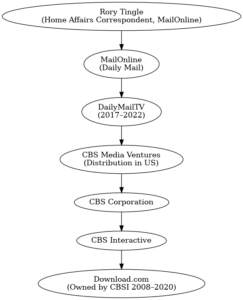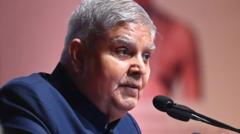As allegations of "vote theft" surface during India's 2024 elections, prominent opposition leader Rahul Gandhi claims systemic manipulation has compromised electoral integrity. The Election Commission and ruling BJP fiercely deny the accusations amid rising political tensions.
Tensions Rise Over Allegations of Electoral Manipulation in India

Tensions Rise Over Allegations of Electoral Manipulation in India
Opposition parties accuse India's Election Commission of favoring the ruling BJP in the 2024 elections, leading to political uproar.
A heated political dispute has arisen in India following serious allegations of "vote theft" directed at the nation's electoral authority. Opposition parties have accused the Election Commission of India (ECI) of manipulating the electoral process to benefit the ruling Bharatiya Janata Party (BJP) during the 2024 general elections.
On a dramatic Tuesday, the Indian parliament faced adjournment as opposition MPs clamored for a debate regarding the nation's electoral integrity. This outcry follows a police crackdown on opposition leaders—led by Congress party figure Rahul Gandhi—who attempted to rally outside the ECI's headquarters in New Delhi. Gandhi initially highlighted concerns surrounding the electoral process during a press conference on August 7, rallying broad support from fellow lawmakers and energizing the opposition.
In response to these severe accusations, the ECI and BJP officials have robustly refuted all claims of misconduct. Alleging extensive voter manipulation, Gandhi has referenced specific data derived from electoral records, which the ECI and BJP contest. India's Prime Minister Narendra Modi successfully attained a third consecutive term, although his ruling coalition did not achieve the substantial majority projected by many analysts.
Gandhi's claims include evidence of over 100,000 questionable entries in Bengaluru's Mahadevapura constituency. He alleges instances of duplicate registrations, invalid addresses, and mass voter registrations at single locations. Illustrating his point, he proposed specific cases, such as one cited voter supposedly casting multiple ballots—claims that the election body disputes. With a reported loss of 48 parliamentary seats attributable to irregular electoral practices, Gandhi contends that the integrity of the election has been compromised.
He insists that the ECI make digital voter rolls publicly available for external auditing, though these claims have not been independently verified.
In a rapid counter-response, the ECI utilized social media platforms to label Gandhi’s allegations as unfounded, demanding formal a signed declaration under oath or a public retraction. The ECI further stated that the Congress party failed to challenge the electoral roll revisions adequately prior to the elections. BJP leaders have also voiced their strong denial of any wrongdoing, with BJP’s agricultural minister condemning the opposition’s actions as detrimental to the country’s democratic framework.
The political storm intensified due to concurrent issues surrounding the verification of electoral rolls in Bihar—a vital state for upcoming elections—where critics argue that many legitimate voters, particularly marginalized groups, are at risk of disenfranchisement. While the ECI maintains that recent roll verification efforts aimed to address duplicates and deceased registrations, many voters have reported inconsistencies and inaccuracies in their records.
Currently, the accuracy of the electoral rolls is under evaluation by India’s Supreme Court, which is requested to intervene if widespread voter exclusion is confirmed. As allegations persist, Gandhi has escalated his rhetoric, labeling the situation as part of a broader, systematic approach to electoral manipulation nationwide.



















